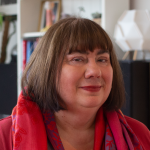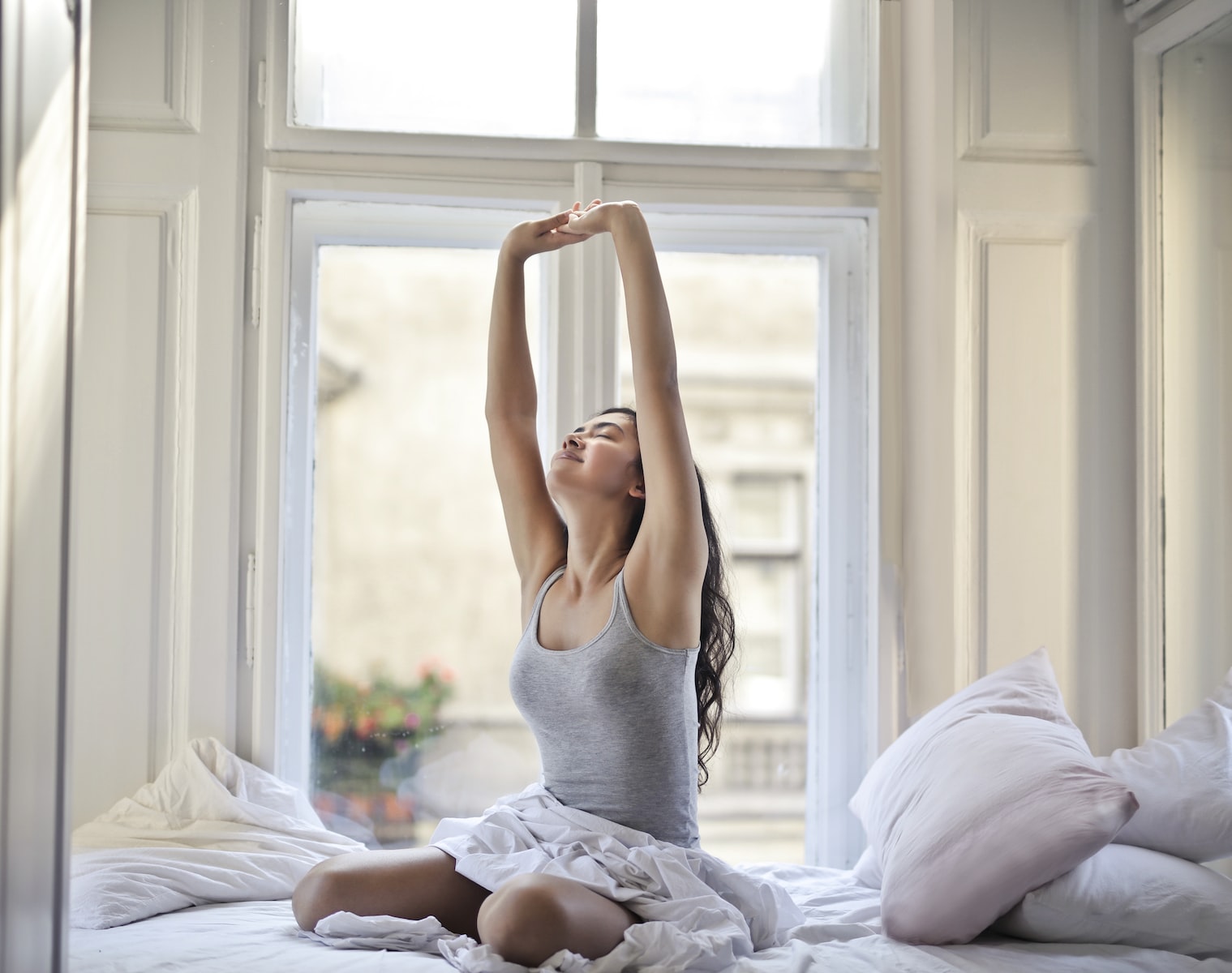Taboos relating to menopause are gradually dissolving. Good employers now have policies designed to educate managers about menopause, and increased workplace flexibility allows women to manage menopause symptoms.
But what if we could alleviate symptoms rather than just manage them, so that women have a better experience of menopause? That would be great for both employers and employees. How can we do that?
If employers listen to their employees who are going through perimenopause and menopause the one thing they will continually hear is, ‘I can’t sleep.’ ‘I’m waking up to 6 times a night. I am not rested, and it affects my mood and activities.’; “I am desperate. Doing everything I can…Good sleep hygiene, no tech in the bedroom, light in the morning, exercising, eating well …I feel like there is nowhere for me to turn. ”
It’s a situation familiar to poor sleepers over the world, but particularly women experiencing perimenopause and menopause. Insomnia affects women disproportionately. Statistically, women are 40% more likely than men to face insomnia and women in their forties to sixties are particularly vulnerable. For many, it is a continuation of a pattern that began during child-bearing years.
Most women experience insomnia when pregnant. For some, a pattern of poor sleep can become entrenched, as they listen out for waking babies. Women who recover a good sleep pattern as their babies grow up often re-experience insomnia as menopause approaches. Around 60% of perimenopausal and menopausal women experience insomnia. Sleep hygiene education has minimal impact on the sleep of this group.
Why do women have such poor sleep during perimenopause and menopause? It boils down to the effects on the brain and body of diminishing hormones, including reduced production of sleep-inducing hormones.
The knock-on effects of prolonged poor sleep include mood swings, depression, brain fog, suppressed immunity and, longer term, a higher chance of dementia. Not surprisingly, this has a profound effect on women’s experiences of work as they get older. It affects decision-making and productivity as well as the less quantifiable benefits of happiness and self-confidence. According to The Fawcett Society, 1 in 10 women who worked during the menopause left a job due to their symptoms, with 26% taking time off work as a result, 22% of whom were away for more than a month.
Imagine for a moment the cost to the individual and their employer of a month’s absence. For the employer, it may mean covering the cost of temporary cover and losing a key worker. For the employee, exhausted and fearful that sick leave is nibbling away at their professional credentials, it’s time off they’d rather not be taking. The true cost of the menopause on the country’s economy is estimated at £10 billion and the cost of poor sleep at around £40 billion.
Put bluntly, if companies can retain their older, female staff by helping them to sleep well, they protect their bottom lines. Happier employees are more motivated, more productive and creative. As a business, you’ll have more satisfied customers and waste less on recruitment and retention. An employee is more likely to remain loyal if you take the trouble to listen and understand.
What can employers do to help women to have a better experience of menopause, and especially, to sleep better during this time?
I run Zeez Sleep, a start-up which has developed a sleep device, the Zeez Sleep Pebble. Our biggest user group is perimenopausal and menopausal women. We listen to their stories. So, what can a switched-on employer do to help? Here are some simple ideas that can be rolled out and will not only benefit individuals, but make sound business sense.
Nutrition
Much has been said about the need for workplaces to provide affordable, healthy choices. This is particularly relevant for women as they reach perimenopause since the body becomes less efficient at absorbing the nutrients that are essential for relaxation and sleep as hormone production slows down. When it comes to ensuring good sleep, unprocessed food, fibre, low sugar, and food including good fats and Omega 3, can make a real difference. Prue Leith, Henry Dimbleby, Jamie Oliver et al are well qualified to write on the subject of sound nutrition. They know their onions. And their oily fish.
No matter how good your canteen, food today is unlikely to give us all the nutrients we need, especially at a time when our body’s ability to absorb nutrients is diminishing. Supplements can help and our key recommendations are:
- Magnesium missing from today’s food and water. Most of us need a fairly large daily dose of an absorbable form such as Magnesium Citrate, Glycinate or Malate (not Magnesium Oxide, which is not absorbed).
- Vitamin D is the sunshine vitamin: we make it naturally using daylight of a particular spectrum. In northern European climates, we can’t make Vitamin D from October to April, and unless your employees spend much of the day outside, they probably aren’t getting enough during the rest of the year either. Vitamin D protects the immune system and helps our sleep.
- Omega 3 is the fatty acid found in oily fish (think cod liver oil, or don’t if it makes you cringe). It’s found in non-animal foods too, such as walnuts, flax, chia and hemp seeds. Studies show that it improves the quality of our sleep. Oily fish and walnuts are expensive and most busy women will struggle to find flax and chia seeds on their evening dash round the supermarket. So, a supplement is worth considering.
Employers could help by providing nutritional support, and allowing a moment in the day, free of pressure, where staff can take a breath, relax, and think about what they need. We are more likely to eat well if we are relaxed when we eat.
Daylight
As a switched-on employer, encourage your staff to take breaks outside and if at all possible, provide somewhere pleasant outdoors to sit. Daylight is essential for good sleep (for Vitamin D, melatonin production and setting our circadian clocks) and it is good for us at all times of day and year. To make Vitamin D we need 30 mins’ exposure to sunshine on days when the sun shines, at a time when our shadow is shorter than we are, before applying sunblock.
Exercise
Movement and exercise, especially morning exercise, are good for our sleep. If you can encourage walking and cycling to work, do.
Zeez Sleep
Zeez Sleep makes the Zeez Sleep Pebble, a small device that gently copies the brain frequencies of a ‘good’ sleeper and in a timed sequence over four sleep cycles, prompts a natural sleep pattern. Our technology is unique, and usually very effective.
Our customers are about fifty-fifty male / female, all ages. As mentioned, our biggest user group is perimenopausal and menopausal women. Amongst this group, our success rate is around 80%. It isn’t always quick – hormonal challenges can mean that it takes longer for perimenopausal women to respond to the Zeez Sleep Pebble than others – but when the Zeez is used as intended, with supplements and without interference, the results can be extraordinary.
Marianne was highly successful and highly earning, but with menopause, her sleep issues started. She says she put this down to stress.
I reduced my work and the stress, but my sleep patterns regressed. I felt lucky if I was achieving 3 hours of sleep twice a week. More often, I was sleeping 1 hour a night and sometimes not at all. I was desperate, trying not to become addicted to sleeping medication, a danger on the roads and I felt helpless and depressed.
The first night, [with the Zeez] I felt relaxed and drifted off for a few hours. The second night I slept longer, and entered a deep sleep. The third night I slept six hours. It was wonderful to wake up feeling like my brain had rested. On a bad night I now sleep 6 hours with some waking. On a good night, 8 hours without waking. I feel like the Zeez has saved my sanity.
Employers can help alleviate menopause symptoms
For too long, women have soldiered on through the menopause while feeling lousy and exhausted. And alone. Ignoring menopause can have tragic consequences as we are all too aware. For the majority of women, it’s a natural process that can have a profound effect on wellbeing, career and even pension provision. Yet there are many simple things available to help women feel less alone, and more supported when handling menopause symptoms.

Anna McKay
Anna McKay was a globally recognized intellectual property lawyer, litigating big patent and competition law cases mostly involving medicines and science, usually against multinationals. She was also a truly dreadful insomniac, unable to sleep at night, but liable to drop off when not engaged in demanding work.
In 2016, Anna took her creativity, her knowledge of medicine and inventions, and concentrated on sleep - specifically, the brain's activity during sleep, and how good sleep patterns might be encouraged. Eventually Anna founded Zeez Sleep, developing, testing, making and now selling sleep tech designed to prompt good sleep.


